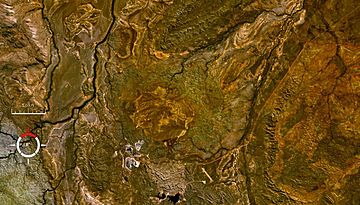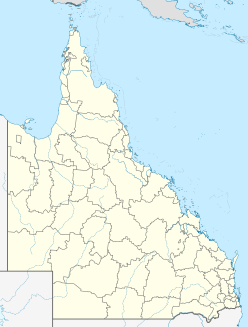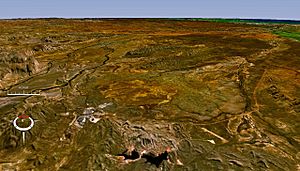Lawn Hill crater facts for kids

Landsat image of Lawn Hill crater (circular feature in centre); screen capture from NASA World Wind
|
|
| Impact crater/structure | |
|---|---|
| Confidence | Confirmed |
| Diameter | 18 km (11 mi) |
| Age | Ordovician |
| Exposed | Yes |
| Drilled | No |
| Location | |
| Coordinates | 18°40′01″S 138°37′48″E / 18.667°S 138.63°E |
| Country | Australia |
| State | Queensland |
The Lawn Hill ‘crater’ is a really old impact structure in northwestern Queensland, Australia. It's about 220 km north-north-west of Mount Isa. This means it's the leftover part of a giant hole made when something from space crashed into Earth.
Today, you can see an 18 km wide ring of dolomite hills. For a long time, scientists weren't sure what made this perfect circle. But in 1987, they found special rocks called shatter cones and shocked quartz in the middle. These rocks only form when something hits the ground with incredible force, proving it was an impact crater.
What is the Lawn Hill Crater Like Today?
The Lawn Hill crater has been worn away by weather and time. Scientists think the original crater might have been a bit bigger, maybe around 20 km wide.
For a while, there was a debate about the age of the crater. Some thought the limestones, which are from the Middle Cambrian period (about 510 million years ago), were just laid down in the crater after it formed. Others believed the impact actually changed these rocks.
How Old is the Lawn Hill Crater?
These different ideas meant the crater could be from the earlier Cambrian or Proterozoic periods, or even a younger time called the Paleozoic age.
One study suggested the impact happened just before or during the early stages of the limestone forming. This would mean it was around 509–506 million years ago (Middle Cambrian).
However, scientists now believe the impact happened during the Ordovician period, about 472 million years ago. They figured this out by studying tiny melted bits of rock from the impact.
At that time, the area was still collecting lots of sediment, like mud and sand. This helped bury the crater. Because it was buried, the crater stayed in really good shape over millions of years.
 | May Edward Chinn |
 | Rebecca Cole |
 | Alexa Canady |
 | Dorothy Lavinia Brown |



